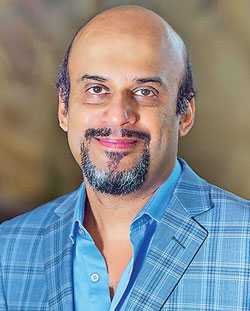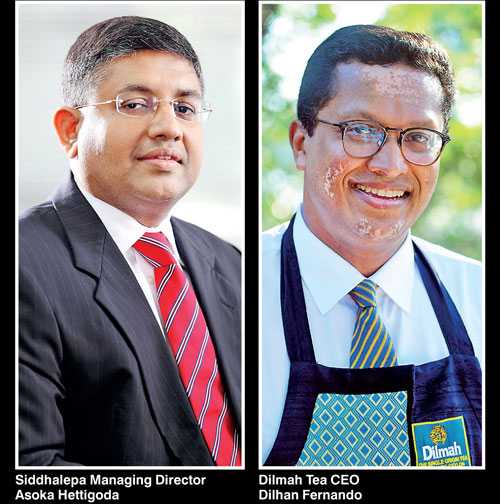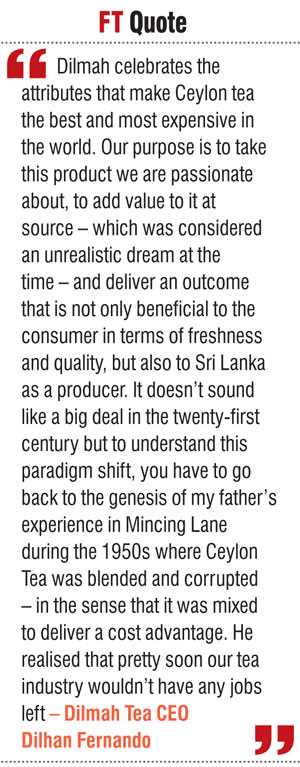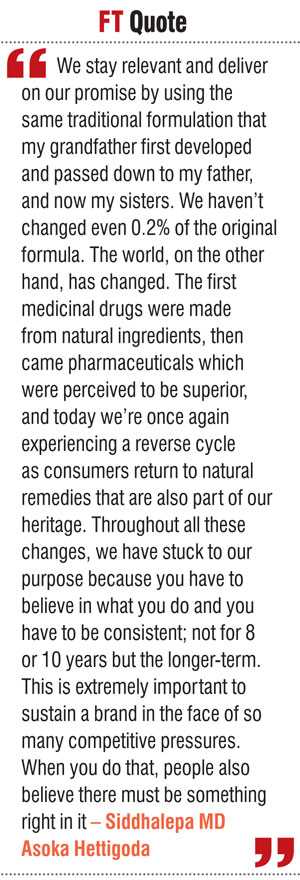Wednesday Feb 18, 2026
Wednesday Feb 18, 2026
Thursday, 20 September 2018 02:20 - - {{hitsCtrl.values.hits}}
Michel Nugawela sat down with Siddhalepa Managing Director Asoka Hettigoda and Dilmah Tea CEO Dilhan Fernando to discuss what sets apart their brands as representative symbols of their categories and our wider culture and country
By Michel Nugawela
When brands put authenticity first, results follow 
At Interbrand, we define authenticity as a brand with “an internal truth and capability, a defined heritage, a well-grounded value set, and an ability to deliver against the (high) expectations that customers have.” Interbrand believes that authenticity, like each of its 10 Brand Strength factors, represents a potential lever for growth.
Authenticity also sets apart Dilmah and Siddhalepa as representative symbols that are worthy of our affection and affiliation. Their strengths derive from how they respond and stay relevant in a swiftly changing world, certainly, but also from what they stand for and where they come from – their founding idea and provenance.
Largely because of this, their impact on the world is more purposeful, meaningful – and as we shall see tomorrow in Part 2 – cultural.
ONE: Putting purpose at the heart of the business
Strongly authentic brands have a profound understanding of their reason for being – a founding idea or association with an era, category, culture, or country that gives them a verifiable origin. This inward strength sustains them as they grow, adapt, innovate, disrupt, and generally master the outward strengths that are necessary to increase their relevance.
“Siddhalepa is primarily a medicine brand that provides traditional, natural solutions for ailments,” says Hettigoda. “We provide good health through an effective remedy that works day-in and day-out. We stay relevant and deliver on our promise by using the same traditional formulation that my grandfather first developed and passed down to my father, and now my sisters. We haven’t changed even 0.2% of the original formula.
“The world, on the other hand, has changed. The first medicinal drugs were made from natural ingredients, then came pharmaceuticals which were perceived to be superior, and today we’re once again experiencing a reverse cycle as consumers return to natural remedies that are also part of our heritage.”
“Throughout all these changes, we have stuck to our purpose because you have to believe in what you do and you have to be consistent; not for 8 or 10 years but the longer-term. This is extremely important to sustain a brand in the face of so many competitive pressures. When you do that, people also believe there must be something right in it.
For Fernando, “Dilmah celebrates the attributes that make Ceylon tea the best and most expensive in the world. Our purpose is to take this product we are passionate about, to add value to it at source – which was considered an unrealistic dream at the time – and deliver an outcome that is not only beneficial to the consumer in terms of freshness and quality, but also to Sri Lanka as a producer.
“It doesn’t sound like a big deal in the twenty-first century but to understand this paradigm shift, you have to go back to the genesis of my father’s experience in Mincing Lane during the 1950s
where Ceylon Tea was blended and corrupted – in the sense that it was mixed to deliver a cost advantage. He realised that pretty soon our tea industry wouldn’t have any jobs left.”
TWO: Entrepreneurs first disrupt themselves
 In recent years neuroscience has made significant progress in explaining how our mind works, so a good place to start is by asking, What habits of mind are best able to reframe new points of view about what comes next? What intellectual behaviours does it take to reinvent existing categories or create entirely new ones?
In recent years neuroscience has made significant progress in explaining how our mind works, so a good place to start is by asking, What habits of mind are best able to reframe new points of view about what comes next? What intellectual behaviours does it take to reinvent existing categories or create entirely new ones?
It helps to have the right answers to these questions because business models, stripped to their bare essentials, are mental models that often limit us to familiar ways of thinking and behaving. We then struggle to see and connect new patterns and possibilities.
Siddhalepa Vedemahatmaya and Merill Fernando are synonymous with the categories they reinvented, initially as challengers of established beliefs and market positions, and thereafter as cultural leaders who created superior value, and with it, social change.
Their ‘vision calls’ reframed perspectives and enabled people to see an old reality with new eyes. They recreated meaning through new angles of vision.
Piero Formica, founder of the International Entrepreneurship Academy, says the reinvention of categories is realised by minds that “avoid best practices, rules, and existing rights of way. They don’t need the comforts of roads already travelled and don’t filter their visions through the judgments of others.”
“Innovation, for them,” Formica says, “is a form of disobedience; they revel in the uncertainty and unpredictability of creating solutions that are unique … and sometimes cause fundamental alterations to what is understood about the world.”
“They can”, he adds, “be terrifyingly disruptive, depending on the institutional, entrepreneurial, and social contexts in which they act.”
As brands, Siddhalepa and Dilmah are authentically relevant because their creators have found and embraced their authentic self. Entrepreneurs who disrupt categories and systems first disrupt themselves. They find their purpose – the meaning that motivates their actions – and, in turn, make a dramatic impact in their time and place.
Dilhan: “My father often says that Ceylon Tea is the message and he is the messenger. He was the original disruptor who had to sell a high-cost product at a profit and he had to do it differently, without following the others. So he asked, ‘What is the angle?’
“He was among the first group of Ceylonese tasters who were allowed to enter the industry, but never expected to start their own businesses. They were expected to work for one of the British brokering houses. At the time, we had political independence without even a semblance of economic independence.
“It was also seen to be foolish rather than courageous to go against everything and everyone, including his peers and customers in the industry. But he is responsible for today’s acceptance of the concept of a farmer taking his produce to market.”
Asoka: “My father started Siddhalepa in a highly competitive environment, and at the bottom of it. He was asked why he was trying to sell thel beheth in a market dominated by pharmaceuticals. When you consider it, it was the worst possible time to introduce an ayurvedic product.
“Ayurvedic companies didn’t exist before Siddhalepa, just traditional vedemahatmaya’s and their clinics. There weren’t any ayurvedic soaps, toothpastes, or balms either. We created the category.”
THREE: Divergence to achieve systemic change
Most businesses converge within a category. They focus on the existing needs of customers, maintain parity with their rivals, and share similar dimensions like product offers, consumer segments, cost structure, and distribution channels. Their primary goal is to return profit to their owners. But brands like Siddhalepa and Dilmah reap the rewards of breakthroughs in value creation by diverging from accepted boundaries and practices in their search for unoccupied territory.
Asoka: “To do something unique, something relevant, and something people will remember – that takes a lot of effort. It requires a lot of discussing and hard thinking. For example, we recently launched Aqualive, a range of beverages with zero sugar, zero preservatives, zero chemicals, and zero colour to address the huge generational shift away from fizzy drinks.
“It’s 100% natural and combines the pure extract of traditional herbs that villagers drank in the mornings and afternoons 150 years ago, before tea was introduced. It’s also relevant to Siddhalepa’s unique promise because the base is medicinal.
“We consistently debate our strategy and product development for the next two or three years: which areas should we go into? Are they relevant to our business? Will our brand extend? Will it be strengthened or diluted?”
Dilhan: “We can triple our exports if we adopt a penetrative strategy and forget about quality and positioning. Many of our colleagues follow a single commodity approach and promote common and popular blends like English Breakfast.
“When we offer a premium tea, we never talk about the Englishness of it because that brings us to the same level as our competitors. Instead, we choose to take the aspects of Sri Lanka that many of our competitors see as a disadvantage and play them to our strengths.
“We celebrate the different regions; the teas of different character, taste, and flavour; the freshness, provenance, and authenticity; the monsoons that add further variation. We talk about the influence of nature and are probably the only company to spend money on researching the effects of basalt, loamy or sandy soils on tea.
“We invest in research, laboratories, and the Rolls Royce of machinery. We look very differently at the product, with absolute commitment and passion for the herb. We have to focus on all these positives because we go at a premium to customers.”
In their fascinating book Getting Beyond Better, the management consultants Roger Martin and Sally Osberg explain how activists, disruptors, visionaries, changemakers, and other creators of authentic brands like Siddhalepa Vedemahatmaya and Merill Fernando find new ways to transform unjust systems that disadvantage large numbers of people, and bring a new and fairer equilibrium to society. Their focus is systemic with a clear intent to create social change. Higher profits are simply a measure of their higher purpose – not the goal.
Dilhan: “All the great things about the beautiful Nuwara Eliya’s and the wonderful Darjeeling’s lost their relevance when big business took over the industry. They replaced passion with profit, and where tea is concerned, when you replace passion with profit, you move away from Ceylon tea to tea that is one-fifth the cost.
“Whether tea, coffee or cocoa, it was a debilitating economic order that prevailed then, and to a significant extent prevails now. Look at the Ivory Coast, a very significant producer of cocoa. Look at Brazil, Colombia or Ethiopia – their coffee is everywhere; there are hundreds of brands but how many of them have managed to make it internationally?
“Today we talk about Dilmah going to a hundred countries but that’s just not enough because if you go to England or the US, you’ll find low quality, non-producer

brands in virtually every category. There’s a lot of lip service paid to the concept of a farmer bringing his or her produce to market, but in practical terms the international system is geared towards a handful of multinationals.”
Asoka: “It takes a lot of effort to create something unique but the most important thing is that it improves the health and wellbeing of people. When my grandfather passed away in 1982, I was 15 years of age but still old enough to understand who he was. All the medicines he made were from his own money and he refused to charge his patients for treatment, so he was broke.
“The only wealth my grandfather had was his knowledge and he told my father, ‘Victor, I am not giving you a business but a knowledge base to safeguard and contribute to society. My grandfather taught my father, and, in turn, we were taught, that ayurveda was a social service.
“In providing that service you could make money and profit, but not excessively. You had to give a percentage free; you had to give back to society. These fundamentals continue to run through our veins.”
FOUR: The best defense is a good offence
As businesses converge, their brands try to mean something to everyone and unwittingly end up meaning nothing to anyone. They become bland and indistinguishable from each other. Here again, authentic brands amplify their differences to stand apart from their unremarkable rivals.
They take stances, advance causes, and bond with purpose-hungry consumers, inspiring them to evangelise for their products. They pick a side, polarise, provoke a reaction – and when needs be – they even fight. Driven by a powerful meaning that motivates their actions, they demonstrate the courage of conviction.
Asoka: “My father applied to the drug formula committee for approval of Siddhalepa balm. It was entirely British, except for Professor Senaka Bibile, who finally approved his application on the thirteenth attempt. He received provisional approval for three months but was told it would be withdrawn if they received any consumer complaints.
“When my father produced the first Ayurvedic soap, the authorities informed him that soap wasn’t permitted to include Ayurvedic ingredients. When we produced Supirivicky with brown-coloured toothpaste, they protested that consumers wouldn’t put ‘mud’ in their mouths.
“When he introduced the first 100% natural mosquito coil, they enforced a law for pesticide control, first introduced by the British in the 1920s, saying it wouldn’t kill mosquitoes. My father said, ‘My intention is to repel and not kill them. I don’t mind them being on my wall.’ They refused, so he filed a lawsuit. By that time, we had obtained an international patent for the mosquito coil and were selling it in container loads to Italy.
“We’ve jumped a thousand hurdles for every new product that we’ve launched.”
Dilhan: “My father lost all his bulk tea customers and orders when our tea bag machine arrived. But it was our tea industry, from the Tea Board downwards, that was very much against him and tried to block him. They thought it would destroy the entire tea industry.
“It took courage to go against everything, to risk everything, including his personal safety, when there were such powerful vested interests in the system. We got kicked around for years.
“Those who want to liberalise imports don’t get the fact that what Sri Lanka offers – the origin, provenance, different micro terroirs and varieties – is exactly what the consumer is asking for. Everyone calling for liberalisation is saying, ‘We’re chilled out. We’re in this year. We’re going to retire at 40 or 50. We want to make a lot of money in a short time.’
In Part 2 tomorrow…
Siddhalepa and Dilmah create an intangible experience of shared meaning and facilitate a powerful sense of belonging to a larger brand community. “They speak as rebels,” says Harvard Business School professor Douglas Holt, “and assemble a credible challenge to the national ideology by drawing on people who actually live according to alternative ideals.”
(The writer heads the Interbrand
Sri Lanka office.)